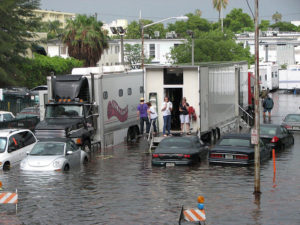
“Burn Notice” TV program filming disrupted by Miami Beach flooding
There have been a spate of articles in recent months demonstrating that climate change is now hitting homeowners, business owners and local governments square in the pocketbooks. While Florida is the tip of the spear on climate change due to its low elevation and prevalence of water, folks in other states as disparate as Vermont are feeling it too. Americans have a track record that, when things affect us monetarily, it becomes a tipping point where people call for action. We are now reaching that tipping point.
In South Florida, city officials and residents are terrified about predictions of seas rising higher than their land, which in many areas is only a few feet above sea level. As a result, Miami Beach is investing $500 million in pumps and construction (such as raising roads and seawalls) to deal with rising seas. The Florida Keys are even more vulnerable, as even a six-inch rise in sea levels reportedly will inundate large areas of land. For these areas,
In the long term looms the daunting, big-dollars prospect of raising homes, roads, buildings. It will all add up to billions.
On the mainland in Miami, the flooding and predictions of sea level rise are so bad that some municipalities are even contemplating “demolishing properties and returning developed areas back to nature.” According to another proposal, “zoning laws and building regulations would be changed to lure development toward mass transit corridors on high land and away from low-lying areas, where new homes would need to be ‘amphibious.'” Of course, these would be extremely expensive propositions, which could greatly affect homeowners and property values. Indeed, “eminent domain is not on the table, meaning the plan would rely on dozens of property owners selling voluntarily.” But who would want to buy property in such vulnerable areas, and at what price?
Many miles away, in West Windsor, Vermont, climate change has manifested itself differently, but with similar economic effects. The economic centerpiece of the town is local ski area Mount Ascutney. However, “warming winters and a vanishing snowpack drove the resort out of business in 2010.” This greatly affected not only the owners and employees of Mount Ascutney, but also local businesses such as ski shops and lodges. So the townspeople got together and purchased the Mount Ascutney resort. Of course, they will do their best to market the destination as a recreation area for hiking and other non-winter activities. But those could be a fraction of the all-important ski business that has been lost.
Whether in Florida, Vermont or elsewhere, one big question, therefore, is how will all of these reactions to the effects of climate change after the fact be paid for? Would banks want to loan money? Would insurance companies provide coverage, and how high would they raise their rates? In the Miami Beach area, “the money will come from residents who pay stormwater fees, taxes and — if there is political support — from the state and federal governments.” As for that political support, however, don’t look for Republicans, who now run the entire federal government and the majority of states, including Florida, to want to spend much federal or state taxpayer money when many of them are climate deniers. In Florida, for example, “Gov. Rick Scott — who has largely dodged the climate change issue throughout his tenure — vetoed $750,000 for [Miami] Beach’s pump program.”
The second big question is, what happens when more homeowners, business owners, prospective home buyers and would-be business purchasers realize the risk of owning or renting property in areas that are likely to be hit hard by climate change? We could see not only a meltdown of property and business values, but also the greatest social disruption ever visited upon the United States, as well as in many countries around the world. The evidence is mounting that the costs of addressing climate change after the fact will far outweigh the costs of doing something now, in the rapidly closing window before it’s too late.
Photo by maxstrz, used under Creative Commons license. https://is.gd/yy8Sh6


